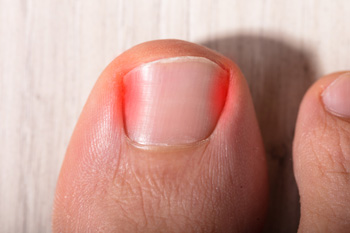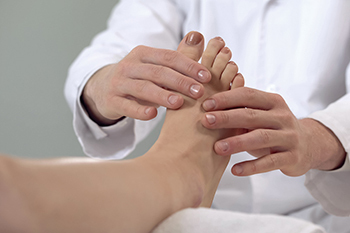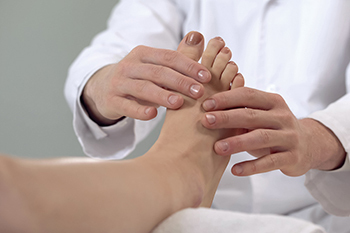Items filtered by date: September 2022
Surgery May Be Necessary for Permanent Relief From an Ingrown Toenail

An ingrown toenail is generally a painful foot condition. It has noticeable symptoms, and occurs as a result of the toenail growing into the surrounding skin instead of over it. The affected skin is often swollen and will appear to be red. In severe cases, an infection may set in, possibly causing bleeding. Wearing shoes that do not fit correctly can contribute significantly to developing an ingrown toenail, or it may come from genetic reasons. Many patients notice that the toe feels better when it is soaked in warm water, which can help to soften the skin. This may bring mild temporary relief, but you may ultimately need to visit a podiatrist for permanent relief. To achieve this, surgery may be necessary, and this involves removing the nail border. The purpose of this is to prevent potential damage to the soft tissues. If you have developed an ingrown toenail, it is strongly suggested that you visit a podiatrist as quickly as possible who can offer you correct treatment options, in addition to possibly performing surgery.
Ingrown toenails may initially present themselves as a minor discomfort, but they may progress into an infection in the skin without proper treatment. For more information about ingrown toenails, contact Jordan S. Steinberg, DPM of Florham Park Podiatry . Our doctor can provide the care you need to keep you pain-free and on your feet.
Ingrown Toenails
Ingrown toenails are caused when the corner or side of a toenail grows into the soft flesh surrounding it. They often result in redness, swelling, pain, and in some cases, infection. This condition typically affects the big toe and may recur if it is not treated properly.
Causes
- Improper toenail trimming
- Genetics
- Improper shoe fitting
- Injury from pedicures or nail picking
- Abnormal gait
- Poor hygiene
You are more likely to develop an ingrown toenail if you are obese, have diabetes, arthritis, or have any fungal infection in your nails. Additionally, people who have foot or toe deformities are at a higher risk of developing an ingrown toenail.
Symptoms
Some symptoms of ingrown toenails are redness, swelling, and pain. In rare cases, there may be a yellowish drainage coming from the nail.
Treatment
Ignoring an ingrown toenail can have serious complications. Infections of the nail border can progress to a deeper soft-tissue infection, which can then turn into a bone infection. You should always speak with your podiatrist if you suspect you have an ingrown toenail, especially if you have diabetes or poor circulation.
If you have any questions, please feel free to contact our office located in Florham Park, NJ . We offer the newest diagnostic and treatment technologies for all your foot care needs.
Signs of an Achilles Tendon Injury

There are different ways in which an individual may injure their achilles tendon, the tendon that runs from the calf muscle to the heel bone in the lower leg. For example, an individual can tear or rupture their Achilles tendon when it is strained or stretched beyond its limits. There are several signs of an Achilles tendon injury to be aware of. Namely, you might experience pain when walking up staircases because the Achilles tendon essentially enables you to lift your heel off of the ground. In the same vein, you could experience difficulty trying to stand on the tips of your toes. Additionally, if you have an Achilles tendon injury, you might notice different types of pain. You can experience sharp pain at the back of the ankle or leg. Snapping or cracking sounds might be heard if you have experienced some kind of Achilles tendon injury. If you suspect that you have developed this kind of injury, do not hesitate to schedule an appointment with a podiatrist, a foot care specialist.
Achilles tendon injuries need immediate attention to avoid future complications. If you have any concerns, contact Jordan S. Steinberg, DPM of Florham Park Podiatry . Our doctor can provide the care you need to keep you pain-free and on your feet.
What Is the Achilles Tendon?
The Achilles tendon is a tendon that connects the lower leg muscles and calf to the heel of the foot. It is the strongest tendon in the human body and is essential for making movement possible. Because this tendon is such an integral part of the body, any injuries to it can create immense difficulties and should immediately be presented to a doctor.
What Are the Symptoms of an Achilles Tendon Injury?
There are various types of injuries that can affect the Achilles tendon. The two most common injuries are Achilles tendinitis and ruptures of the tendon.
Achilles Tendinitis Symptoms
- Inflammation
- Dull to severe pain
- Increased blood flow to the tendon
- Thickening of the tendon
Rupture Symptoms
- Extreme pain and swelling in the foot
- Total immobility
Treatment and Prevention
Achilles tendon injuries are diagnosed by a thorough physical evaluation, which can include an MRI. Treatment involves rest, physical therapy, and in some cases, surgery. However, various preventative measures can be taken to avoid these injuries, such as:
- Thorough stretching of the tendon before and after exercise
- Strengthening exercises like calf raises, squats, leg curls, leg extensions, leg raises, lunges, and leg presses
If you have any questions please feel free to contact our office located in Florham Park, NJ . We offer the newest diagnostic tools and technology to treat your foot and ankle needs.
Children’s Foot Care

Just as with adults, children’s foot care is important to their health and wellbeing. Children’s feet are more delicate, and they are still growing. Properly fitted shoes are vital. Children can also experience unique foot disorders, such as Sever’s disease, flatfoot, plantar warts, or other conditions or deformities. Most children with flat feet do not have pain, but sometimes this can cause difficulty in a child’s participation in sports, or they may walk or run awkwardly. It can cause pain or cramping in the feet, legs, or knees. Sever’s disease is an inflammation of the heel’s growth plate that usually affects kids between ages 8 and 14 because the heel bone is not yet fully developed. Plantar warts can develop on the feet, usually the soles, from the human papilloma virus (HPV). These warts can be deep in the skin and be painful when walking or standing. Should your child have a problem with their feet or they are experiencing foot pain, seek treatment from a podiatrist.
Making sure that your children maintain good foot health is very important as they grow. If you have any questions, contact Jordan S. Steinberg, DPM of Florham Park Podiatry . Our doctor can provide the care you need to keep you pain-free and on your feet.
Keeping Children's Feet Healthy
Having healthy feet during childhood can help prevent medical problems later in life, namely in the back and legs. As children grow, their feet require different types of care. Here are some things to consider...
Although babies do not walk yet, it is still very important to take care of their feet.
Avoid putting tight shoes or socks on his or her feet.
Allow the baby to stretch and kick his or her feet to feel comfortable.
As a toddler, kids are now on the move and begin to develop differently. At this age, toddlers are getting a feel for walking, so don’t be alarmed if your toddler is unsteady or ‘walks funny’.
As your child gets older, it is important to teach them how to take care of their feet.
Show them proper hygiene to prevent infections such as fungus.
Be watchful for any pain or injury.
Have all injuries checked by a doctor as soon as possible.
Comfortable, protective shoes should always be worn, especially at play.
If you have any questions please feel free to contact our office located in Florham Park, NJ . We offer the newest diagnostic and treatment technologies for all your foot and ankle needs.
Signs of Sever’s Disease

If you are the parent of a growing child, it is important to care for your child’s feet. Children can be at risk of developing certain foot conditions that can negatively impact their feet. One of the conditions that parents should be on the lookout for is Sever’s disease. This condition primarily affects children that are between 10 and 12 years of age. Sever’s disease can typically cause heel pain in a child and the condition occurs when the calcaneal apophysis becomes inflamed due to some sort of microtrauma commonly involving the Achilles tendon. There are several signs of Sever’s disease that you might be able to identify in your child. First, if your child has Sever’s disease, they might experience heightened pain when engaging in running, walking, and other weight-bearing activities. Additionally, after a period of physical activity, your child might exhibit a limp. If your child is exhibiting any of the aforementioned symptoms, contact a podiatrist for medical assistance and attention.
Sever's disease often occurs in children and teens. If your child is experiencing foot or ankle pain, see Jordan S. Steinberg, DPM from Florham Park Podiatry . Our doctor can treat your child’s foot and ankle needs.
Sever’s Disease
Sever’s disease is also known as calcaneal apophysitis, which is a medical condition that causes heel pain I none or both feet. The disease is known to affect children between the ages of 8 and 14.
Sever’s disease occurs when part of the child’s heel known as the growth plate (calcaneal epiphysis) is attached to the Achilles tendon. This area can suffer injury when the muscles and tendons of the growing foot do not keep pace with bone growth. Therefore, the constant pain which one experiences at the back of the heel will make the child unable to put any weight on the heel. The child is then forced to walk on their toes.
Symptoms
Acute pain – Pain associated with Sever’s disease is usually felt in the heel when the child engages in physical activity such as walking, jumping and or running.
Highly active – Children who are very active are among the most susceptible in experiencing Sever’s disease, because of the stress and tension placed on their feet.
If you have any questions, please feel free to contact our office located in Florham Park, NJ . We offer the newest diagnostic and treatment technologies for all your foot and ankle injuries.

